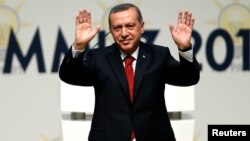Prime Minister Tayyip Erdogan will run for Turkish president in the country’s first direct election in August, his governing AK Party confirmed on Tuesday.
In a convention center decorated with huge images of the prime minister and ringing with the cheers of 4,000 party members, Deputy Prime Minister Mehmet Ali Sahin announced Erdogan would seek to become Turkey’s 12th president and the first to be directly elected by the people.
A slick video of Erdogan’s four-decade political career charted his rise from lemon seller to Turkey’s most powerful politician. The 60-year-old has served as prime minister since 2003.
In a combative speech, Erdogan drew heavily on his Islamist political roots and reminded his pious supporters of the discrimination they faced in the past from Turkey’s secular former rulers.
“They called us regressive because we said our prayers,” Erdogan said. “They said we were not good enough to be even a village leader, that we could not be prime minister, that we could not be elected president. They did not even see us as an equal person in the eyes of the state.”
The speech is likely to increase the political polarization surrounding the prime minister, some critics said.
Erdogan's main rival is expected to be the Ekmeleddin Ihsanoglu, the joint candidate of the main opposition parties, the center-left Republican People’s Party and the right-wing nationalist National Action Party. Ekmeleddin is an academic and former head of the Organization of the Islamic Conference.
The third candidate is Selahattin Demirtas of the pro-Kurdish People’s Democracy Party.
The candidates’ vision for the presidency is likely to add to a sense of division, said Sinan Ulgen, a political analyst with the Carnegie Europe Institute in Brussels.
"They will compete with a different vision about how they want to run the country, with Erdogan making it clear that he will want to continue to be part of executive decision making while opposition candidate Ihsanoglu will stand for a less intrusive presidency, much more in line with the current constitution ,” Ulgen said.
“But I think fundamentally, for the people who are going out to vote on Aug. 10, it is really going to be about whether they want to see Erdogan or not."
Erdogan is campaigning with the slogan “national will, national power.” He says whatever the election outcome, Turkey will not be the same.
He says those who ask for a neutral president in reality want a president who will side with the state against the people, and that era is closed. Aug. 10 will bring not only the election of a president, but also the end of dominance.
Several opinion polls predict Erdogan will get more than 50 percent of the vote, despite a scandal involving graft. Political analysts say his campaign skills and strong party and financial support make him the overwhelming favorite.
But the same analysts warn if the election goes to a second round, Erdogan’s polarizing reputation and fears of a more authoritarian government could make him vulnerable.






